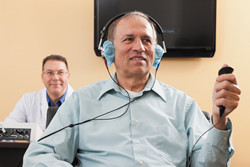Diseases & Conditions
Ringing in the ears: Get it checked
|
Men with tinnitus should get a comprehensive hearing exam, with education on therapy options. Image: Thinkstock |
Tinnitus can't be cured, but find out about proven treatments for persistent and bothersome sounds.
About a quarter of men in their 60s and 70s develop hearing loss. Along with it may come tinnitus—ringing, hissing, buzzing, and other sounds in your head. For many men it's just a minor distraction. For others, it's a serious problem that causes depression, insomnia, and difficulties with work and family life.
Certain proven remedies help make tinnitus easier to live with. But first, see a hearing specialist for a comprehensive exam and to learn your options. "The worst thing we can do is tell the person there is nothing we can do about it, so go home and live with it," says Dr. Eduardo Corrales, an instructor in otology and neurotology at Harvard-affiliated Brigham and Women's Hospital. "Not everyone needs treatment, but some men may just need to know what it is and be reassured it isn't a dangerous condition."
How bad is it?
Most tinnitus traces to physical damage to the sound-sensing cells in the inner ear. Fortunately, most tinnitus is neither severe nor particularly bothersome. Some men just get used to it over time. In others, it may only be truly a problem in certain situations—like having a conversation in a quiet room, or lying in bed trying to fall asleep.
Exams have value
If your tinnitus is mild or occasional, Dr. Corrales still recommends that you see a specialist for a comprehensive evaluation to rule out underlying physical causes, such as problems in the brain or blood vessels. A hearing test can set a baseline for measuring future changes. "My recommendation is to get an annual audiogram," Dr. Corrales says. "Is your hearing getting worse? Your tinnitus may also get worse."
The doctor can also explain the basics of tinnitus and recommend simple strategies to cope with it. For example, a bedside environmental sound generator can help mask the ringing in your head and help you get to sleep.
Self-help guides and books can help you cope with tinnitus. A good first step is the American Tinnitus Association website, www.ata.org. It offers resources to educate yourself, and some of them are free.
Hearing aids can help
When hearing loss occurs with tinnitus, a properly fitted hearing aid can actually help with both. "The hearing aid will mask the tinnitus by providing clear, adequate volume," Dr. Corrales says. "The brain will tune in to the normal sounds more than the tinnitus."
It can require multiple visits to an audiologist to fit the hearing aid and adjust the settings. Unfortunately, insurance coverage for hearing aids remains limited, so the added tinnitus control may come at a cost. Medicare does not cover hearing aids.
Avoid unproven treatments
Certain therapies remain unproven at this time. This includes prescription medications such as antidepressants, tranquilizers, and antiseizure drugs. Also, if you hear about dietary supplements or other cures for tinnitus that seem too good to be true, they probably are. "Don't fall for anything on the Internet or the midnight ads on TV," Dr. Corrales says. "We know that none of that works."
|
Disclaimer:
As a service to our readers, Harvard Health Publishing provides access to our library of archived content. Please note the date of last review or update on all articles.
No content on this site, regardless of date, should ever be used as a substitute for direct medical advice from your doctor or other qualified clinician.












 Tinnitus treatments: What works?
Tinnitus treatments: What works?



